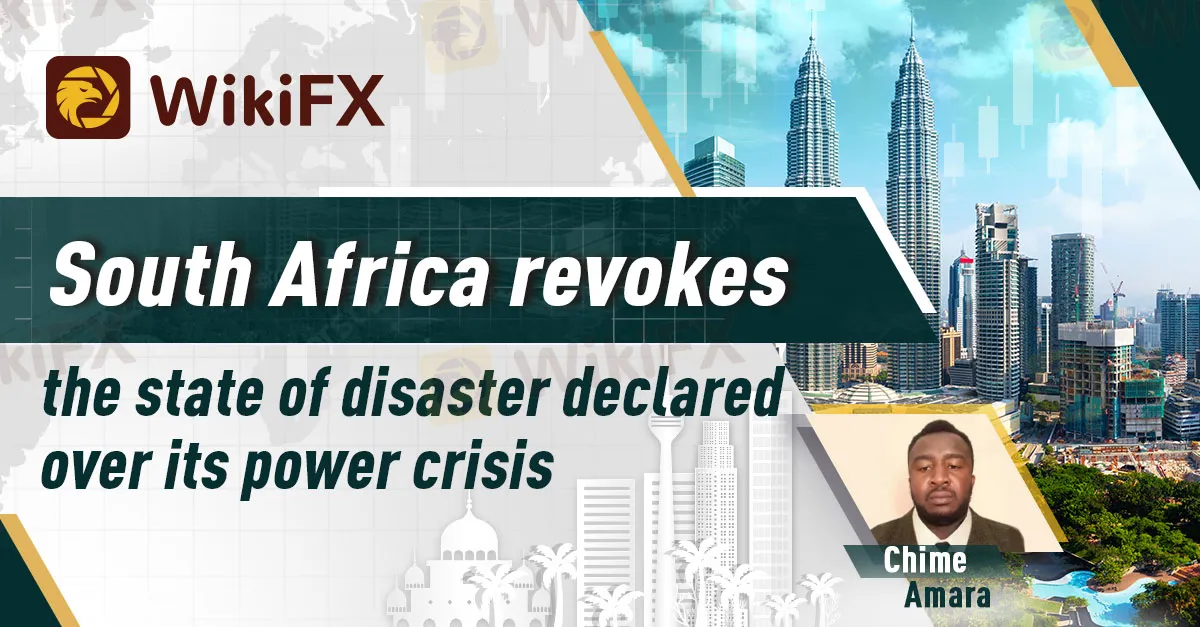简体中文
繁體中文
English
Pусский
日本語
ภาษาไทย
Tiếng Việt
Bahasa Indonesia
Español
हिन्दी
Filippiiniläinen
Français
Deutsch
Português
Türkçe
한국어
العربية
South Africa revokes the state of disaster declared over its power crisis
Abstract:South Africa has revoked the state of disaster that was declared in February to assist in tackling its crippling electricity crisis.

By: Chime Amara

South Africa has revoked the “state of disaster” it declared in February to handle its crippling electricity crisis. The move comes after a civil rights group challenged the status in court, claiming that it would enable corruption. The government has assured that it will continue with the works aimed at reducing the impact of power cuts using the legislation and contingency arrangements, and other emergency measures put in place.
The power crisis has caused daily rolling power cuts by Eskom, with most households and businesses experiencing up to 10 hours without electricity daily.
The decision to revoke the “state of disaster” status was welcomed by many who had concerns about the potential misuse of emergency powers. The civil rights group that challenged the status, OUTA, believes that the crisis can be managed using existing laws and regulations.
However, some stakeholders have expressed disappointment that the withdrawal of the “state of disaster” may slow down efforts to address the power crisis. The telecommunications industry, in particular, had high hopes that the emergency measures would help expedite regulatory relief to address the crisis's effects on the economy.
The power crisis in South Africa no doubt has been ongoing for years, with state-owned utility Eskom struggling to meet the country's electricity demand. The crisis has had a significant impact on the country's economy, with frequent power cuts causing disruptions to businesses and daily life.
The government has stated that it remains committed to finding long-term solutions to the power crisis, including increasing the use of renewable energy sources and reducing reliance on Eskom. However, implementing these solutions will take time and require significant investment, which may not provide an immediate solution to the crisis.
As South Africa moves forward without the “state of disaster” status, many will be watching to see if the government can successfully manage the power crisis using existing legislation and contingency arrangements. The country's ability to do so will be critical to its economic recovery and stability in the years ahead.

Disclaimer:
The views in this article only represent the author's personal views, and do not constitute investment advice on this platform. This platform does not guarantee the accuracy, completeness and timeliness of the information in the article, and will not be liable for any loss caused by the use of or reliance on the information in the article.
Read more

RM1.29 Million Lost in ‘C Baird VIP’ WhatsApp Scam
A 43-year-old company auditor and subcontractor in Malaysia became the latest victim of an elaborate investment scam after losing RM1.29 million to a fraudulent scheme promoted via WhatsApp.

U.S. March ISM Manufacturing PMI Released
The U.S. March ISM Manufacturing PMI data shows that manufacturing has contracted for the first time, and investors should pay attention to future changes and impacts on the sector.

Breaking News! Forex Inflows Surge to $17 Billion
Nigeria's foreign exchange inflows saw a significant increase in the fourth quarter of 2024, reaching $17.39 billion. This growth reflects strong foreign investments and export revenues, bringing new confidence to the market.

April Fool's Day Scam Prevention Experience Collection
Share your “Forex Fraud Prevention Experience”, win WikiFX points and gold rewards!
WikiFX Broker
Latest News
FCA Warns Against 10 Unlicensed or Clone Firms
CySEC Warns Against 14 Unlicensed Investment Websites
Top Currency Pairs to Watch for Profit This Week - March 31, 2025
Will natural disasters have an impact on the forex market?
Philippines Deports 29 Indonesians Linked to Online Scam Syndicate in Manila
Exposing the Top 5 Scam Brokers of March 2025: A Closer Look by WikiFX
Gold Prices Climb Again – Have Investors Seized the Opportunity?
Webull Launches SMSF Investment Platform with Zero Fees
Australian Regulator Warns of Money Laundering and Fraud Risks in Crypto ATMs
The Withdrawal Trap: How Scam Brokers Lure Victims into Paying More
Currency Calculator







